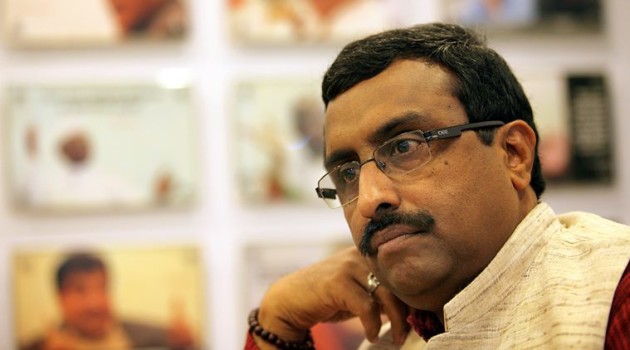Nepal can adopt a Look South policy

Ram Madhav, BJP National General Secretary
Ram Madhav
Nepal and India are not just two countries; they are two great and ancient civilisations. The bonds between the two countries are so strong and sacred that no contemporary development can disturb them.
Three Cs form the basis of this bonding and relationship: culture, connectivity and commerce. From time immemorial, India and Nepal have been cultural and civilisational cousins. Historical and civilisational linkages form a strong bond. Hinduism and Buddhism have always brought them together. From Janakpur to Ayodhya and from Lumbini to Bodh Gaya, the historical journey of the religions and culture remain an inspiring bond between the two countries.
Talking of culture, it is pertinent to mention that grassroots democracy is in the blood of the South Asian nations. Institutions such as the gram sabhas, which existed as a part of the social organisation, make these nations most amenable to democratic institution-building. Modern-day democratic institutions were introduced to India by the British in the last century. After Independence, India had very naturally adopted those institutions and enriched them with native wisdom, as they suited its core cultural ethos. It is today the largest and most successful democracy in the world.
In India’s neighbourhood, all the people that shared this cultural marker have succeeded in promoting democratic way of life. These include Sri Lanka, Bhutan and Bangladesh. Nepal, too, has successfully turned to democracy. India, as a neighbour, has extended its fullest support in Nepal’s endeavour to emerge as a parliamentary democracy. It played a pivotal role in the Maoists in Nepal deciding to join the democratic mainstream of the country in 2006.
Like India, Nepal’s democracy, too, has matured. On the lines of India under Prime Minister Narendra Modi, Nepal, too, has a stable government today with a majority in the parliament. Stability is the key to a democracy’s success and that comes when people repose faith in one party or alliance. India sees an independent and stable Nepal as beneficial to its interests.
The mighty Himalayas with Mount Everest and the sacred Mansarovar lake as well as Lord Pashupatinath in Kathmandu and Buddha at Lumbini have connected India and Nepal for ages. This spiritual connectivity has transcended into physical connectivity with highways, I-ways and roadways. The two governments are working on enhancing this connectivity through railways and waterways. The Raxaul–Kathmandu railway line will be a reality soon, thanks to the determination of Modi and Nepal PM KP Oli. This connectivity is critical for the growth of bilateral commerce too. India-Nepal bilateral trade and commercial ties are too strong to be ever dismantled.
Modi has championed a new neighbourhood policy popularly known as Neighbourhood First. In our relations with Nepal, as with other neighbours, we are guided by the policy of sovereign equality. Sovereignty brings with it a lot of responsibility. As two sovereign neighbours, the two countries have to understand each other’s strategic priorities and concerns. An important element of India’s Neighbourhood First policy is that each country has a sovereign right to pursue its developmental agenda while keeping the strategic concerns of the other in mind. Nepal’s development will help benefit India and vice versa.
India and Nepal are both old and young nations with large young populations. Under the dynamic leadership of Modi, India is undergoing a huge transition. In Nepal, Oli has put emphasis on an economic and development agenda.Nepal, too, is changing fast. So, the challenge in both the countries is to understand and manage consistency and change in our bilateral relations.
India is committed to supporting Oli’s ambitious development agenda. ‘Sab ka saath – Sab ka vikas’ (development for all sections of society) has been the mantra of Modi. He appreciates that the fruits of development should reach the last citizen. In Nepal, too, various sections such as Adivasis, Dalits, women and Madhesis will gain from the government’s focused development activity.
Nepal can adopt Look South as its development policy. Look South doesn’t mean India alone. Today, oceans play an important role in the economic development of the nations. They are the lifelines of prosperity and development. In the south, the Indian Ocean offers Nepal a huge opportunity.Nepal can access the most happening region of the Indian Ocean through Kolkata in India and Chittagong in Bangladesh. It opens up huge opportunities for the country’s development. It will also benefit the Tibetan Autonomous Region of China.
Amid these attractive propositions, there exist some challenges too. Both countries so far have very limited activity with respect to building a knowledge base about each other. Very few universities and centres in India focus on deepening the knowledge base about Nepal. I assume the same is the situation in Nepal. It is time we built new institutions for this purpose in both the countries.
Both Nepal and India are committed to the principles of democracy and inclusive development. Three visits by Modi to Nepal in this one year indicate India’s growing affinity with the Himalayan neighbour which is being enthusiastically reciprocated by the Oli-led government in Nepal.
Ram Madhav is general secretary of the Bharatiya Janata Party. This is the text of his address at the inauguration of the Nepal-India Think Tank Summit in Kathmandu.
